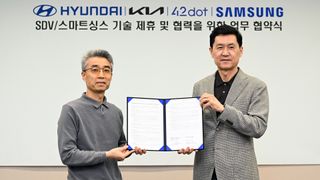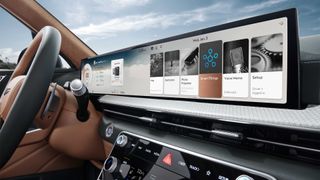Hyundai Motor and Kia team up with Samsung to strengthen infotainment in future vehicles
Automotive giants Hyundai Motor Group and Kia have announced a new strategic technology partnership with Samsung Electronics to help them transition towards the future of Software Defined Vehicles (SDVs).
Speaking to TechRadar at the Consumer Electronics Show in Las Vegas earlier this year, Chang Song, President and Head of Hyundai Motor Group Advanced Vehicle Platform (AVP) Division, explained how the Hyundai and Kia were rapidly heading towards the era of SDVs, where constantly connected cars could do more than transport occupants from A to B, offering on-demand services, the ability to interact with partner apps and control elements of the smart home.
The recent partnership with Samsung cements this notion and will further integrate Samsung’s SmartThings IoT platform with a future infotainment system that Chang Song’s department is busy developing.
This also means that Samsung’s popular Galaxy smartphones will enjoy greater integration with future cars, allowing users to check key vehicle data, such as battery range, upcoming service intervals, and even the location of their vehicles, via their phones.

In addition to this, Hyundai Motor Group also wants the vehicle to fit more seamlessly into everyday life, with the potential for one Samsung Electronics account to manage everything, including health care, pet care, and vehicle systems, in one convenient place.
Chang Song is also a founding member of 42dot, an innovative autonomous transportation company now part of the wider Hyundai Motor Group.
His vision is to create a seamless mobility system that will see one app or piece of software take care of privately owned cars, as well as the ability to summon autonomous ride-share services and potentially electronic vertical take-off and landing craft (eVTOL) like those currently being developed by sister company Supernal.
Analysis: Will ‘killer apps’ kill off the car?

The tie-up with Samsung proves Hyundai Motor and Kia’s commitment to a future where the automobile as we know it becomes more a part of our digital lives than a mere method of transport.
Chang Song spoke of his plan to invite third-party developers to create ‘killer apps’ for his future systems, which would effectively do what Internet Explorer did for Microsoft computers in the 1990s, where customers flocked to the hardware purely to take advantage of the software.
Software Defined Vehicles – and to an extent, electric vehicles – are setting the automotive industry on a path toward cars becoming a commodity, where customers treat their vehicles like smartphones, chopping and changing depending on who offers the best digital experience.
The private ownership model as we know it today will likely change, as advances in technology allow companies like Hyundai and Kia to become transport service providers rather than mere car manufacturers.
Song’s influence in software development, as well as Samsung’s recent integration, will bring more of the wider digital world into the car. Checking in on smart fridges, remotely activating the lights, and being able to locate a vehicle through a Galaxy phone is just the beginning.

